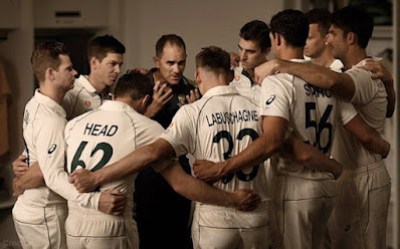Geert Hofstede’s breakthrough findings on ‘Cultural Dimension Theory’, reflect the dynamics that define social structures, the ways they influence the behavior of individuals and institutions, and overall national cultural preferences. He examined IBM employee values from 1967 and 1973 and initially proposed four dimensions, which he later extended to six dimensions: individualism/ collectivism, uncertainty avoidance, power distance, masculinity/ femininity, long-term/short-term orientation, and indulgence/ restraint. Hofstede’s 6-D Model has been widely adopted and narrated by companies to reform their work environment, culture, and employee engagement because it provides broader insights into the ways employees in a multi-cultural environment behave and work.
 |
| Country Comparison, Hofstede’s Insights: Australia (Click for better image quality) |
The 8-episode Amazon Prime documentary reflects the rise of the Australian men’s cricket team that faced questions of ethics & sportsmanship from the international media and fans worldwide following the ball-tampering scandal against South Africa in March 2018. The team was led by then-captain Steve Smith to play four test matches. The whole world was in absolute shock when the camera caught Cameron Bancroft tampering with the ball and later involvement of Steve Smith and David Warner was discovered. It was the first such incident by a cricketing nation known for producing some of the greatest cricket legends and making cricket one of the most fascinating sports in the world. I have been a fan of the Ashes series (5 test match series between Australia & England) but haven’t followed in recent years. Australian management stripped Steve Smith of the captaincy and David Warner to never considered for team leadership in the future. The former left-arm opener Justin Langer was appointed as Head Coach and Time Paine (wicket-keeper) as the Test Captain.
To confess, I haven’t seriously watched cricket matches in recent years as I used to be excited for major events like the Champions Trophy, the Twenty 20 World Cup, or even World Cup matches. Maybe, cricket has not been part of the lifestyle as it used to be. However, what excited me about watching the documentary was the idea of learning how a team brutally criticized by international media became Twenty 20 World Champion and beat the World Cup Champion Team, England by 5-0 in the 2021 Ashes.
The documentary takes a look at the Australian team’s fall from grace to emerging stronger continuing its legacy of becoming one of the most competitive teams in the world. Here are 5 lessons on team building I learned from the documentary:
1. Use data: Test Cricket sounds lengthy and uninteresting game to any non-cricket fan or even regular cricket fans. However, it’s a real battle of patience, perseverance, and skills. The period explains the mental battle players go through; therefore, you need to figure out the weak spots of opponents to gain psychological conquest. Great teams in any sports use data but it’s the consistency, simplicity, and delivery of data that matters. You need to share performance data in every stage of the game and even bring in experts who show ways to deploy your strengths and manipulate the weaknesses of opponents in your favor. In the D-6 Model, Australia scores 21 in long-term orientation indicating that they respect their tradition, which Australia is famous for; i.e. winning. As Justine Langer terms ‘white noise’ can put a team under extra pressure so they need to focus on the strength instead.
2. Nurture the trouble-shooters: In a practical world, challenges (be it small or large in size & impact) are essential to measuring the resilience of a team. Every team has someone who shines and gets the team through difficult circumstances. In a Strategy Meeting to discuss plans for an important World Cup match against England, Dene Hills, the Team Performance Analyst proposes adding another left-arm bowler to the team. The last five years’ data indicated that England had struggled against left-arm bowlers so they added Jason Behrendorff into the team, who bowled James Vince on the first ball, which set the tone for a brave victory on England’s famous home ground, Lords. According to Hofstede’s findings, Australia is a highly individualist society, where individuals are expected to take initiative and deliver results because they promote meritocracy. It’s inevitably fitting that everyone possesses diverse skill sets and if mobilized rightfully, problem-solving will become a competitive advantage of any team. You just need to cultivate problem-solving in your team. As Steve
Smith shared, “If I want to judge a player, I want to judge them on how they play under pressure.” And Cricket is a game of pressure, especially Test matches that last for 5 days.
3. Harness feedback mechanisms: The Power Distance dimension explains how power, authority, or status defines behavior, interactions, and communication. If a country scores high in Power Distance, authorities are respected and obedience is observed across the society. However, Australia scores 36 indicating that people in authority promote discussion and decisions are participatory. The Australian Coach, Justin Langer along with other coaches & experts allows the captain to lead several sessions and welcomes inputs from other players as well. This creates an inclusive environment, where ideas are explored rather than boxed. This strengthens the team bond cementing collaboration, ownership, and teamwork. In Episode 2, Tim Paine talks about Australian Cricket’s values, legacy, expectations, and ethos. This is a reminder to every team to regularly remember the core principles that bring them together as a team because humans have the tendency to forget as new information flows into our brains. And feedback sessions should be a platform for education and conversation.
4. Celebrate the victory: Large companies usually include team events in annual plans, which in an ideal environment should be a routine occasion instead. Celebrating every individual’s contribution and victory is a team’s victory. This is the actual definition of a high-performing team. On several instances, the Australian management, coach, or captain mentions that they’re privileged to represent Australia or you see the signs of ‘Make Australia Proud’ manifesting a culture of celebrating their history and feeling proud of the legacy. Every tiny win leads to a greater victory only if acknowledged by others. The management should promote a culture of recognition amongst team members that will improve productivity and everyone has a positive mindset towards their purpose as a team. People should feel they’re part of a greater purpose than treating them as a means for achieving the ambition of shareholders or management only. A true sense of purpose fosters a growth mindset and people will continue to grow as the team grows.
5. Importance of Family: The documentary shows the genuine emotions players display before the matches, intense planning for team selection, the gravity of pressure during the matches, and the urgency to win. You will also feel the drama when they lose the matches but they make sure everyone learns from the loss and come back stronger. Besides a strong supportive Cricket culture, I was moved by the level of respect they demonstrate towards ‘time with families’ and the considerable engagement by their families. It’s not just the immediate family members but senior players who turn up to give expert opinions or just for the sake of team motivation because they say it’s not just their team, it’s Australia’s team, it’s the team of kids who dream to represent their country. Their families bear all the sacrifices to play their part equally because according to Hofstede Australians take pride in their success, which is ingrained in their culture.
 |
| Photo from IMDB Site (The Test: A New Era for Australia’s Team) |
My key takeaway from the documentary is that a healthy working environment and culture is not one man’s job but requires a collective effort with a positive mindset that everything they do will impact their families and future generations as well. Although Justin Langer has been removed as the Head Coach due to increasing criticism of his ruthless leadership, I admire his persistence to restore not just Australia’s reputation but the spirit of Cricket in general. It was his dedication that helped Australia to top the ICC World Test Championship ranking. Find your motivation from everything you read, watch or listen to. And learn to progress!
Jawad Jahid


Leave a Reply